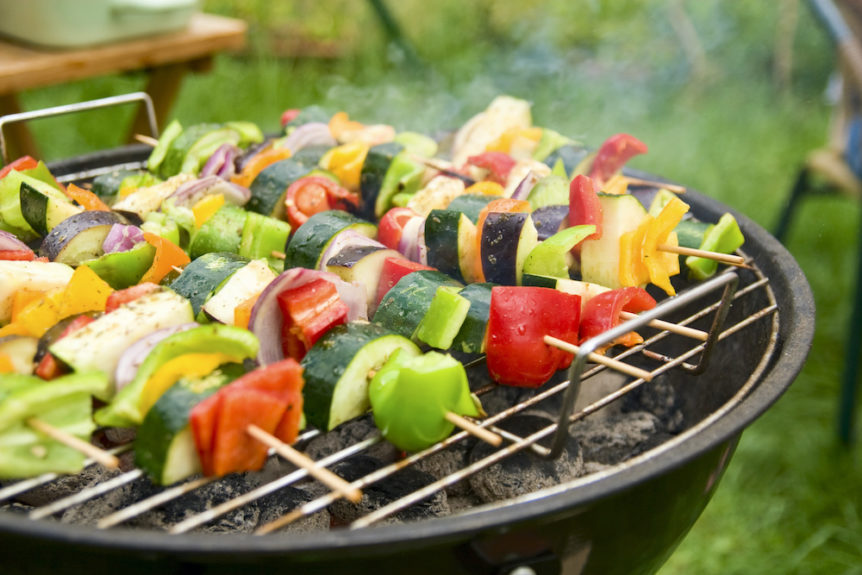
by Lisa Shettle, MS, RDN, CD-N
Grilling can be an easy way to entertain with friends and family in the summer months. Being mindful about grilling can ensure a nutritionally balanced meal that will protect your health.
Without being careful, grilling creates opportunities for cancer-causing substances or bacteria to sabotage your best efforts.
Avoid Common Pitfalls
Grilling meat and fish at high temperatures while over an open flame creates two potential cancer-causing substances: heterocyclic amines (HCAs) and polycyclic aromatic hydrocarbons (PAHs). HCAs are created when meat, poultry, and fish are cooked until they are charred. HCAs are also found in cigarette smoke and have been shown to cause stomach, colon, liver and skin cancer. Polycyclic aromatic hydrocarbons (PAHs) are formed when juices from meat drip onto coals or other hot surfaces and create smoke. These carcinogens are then deposited onto the surface of meat as the smoke swirls around the food.
Below are some ways to help you ensure a healthier grilled meal.
Remove fat. To prevent PAHs and reduce saturated fat, trim the fat off the cuts of meat before grilling. This reduces the amount of fat that can potentially drip onto the coals. Leaner cut options: beef and pork – a loin or round cut such as filet, flank steak, or tenderloin; Poultry: skinless breast meat.
Marinades. Marinating the meat or fish before grilling not only keeps the protein tender and flavorful but also helps to form a barrier and prevent the formation of HCAs. A citrus marinade also adds an antioxidant that helps to destroy the free radicals that are associated with cancer. To prevent PAHs, drain the marinade off of the meat before placing it on the grill. Also avoid spraying olive oil on the grill.
Precook. Another way to prevent HCAs is to cook it for a shorter time on the open flame by precooking the protein and finishing it on the grill. Make sure the meat is not directly over the coals, too. Remember: Always use a separate plate and utensil for raw and cooked meats.
Use smaller cuts of meat. Remember to keep portions in check for overall health. A smaller cut of meat or meat that’s cubed, such as for kebabs, also decreases cooking time.
Avoid grill hot spots. Try to avoid placing food over the “hot spots” of the grill to prevent the creation of HCAs and PAHs. This also helps prevent foodborne illness. Cooking food over a hot spot can mean it’s cooked on the outside but not cooked completely on the inside: a possible food-safety issue. Try to place foods where they will cook slowly and evenly.
Temperature safety. In outside warmer temperatures during the summer, the bacteria that cause foodborne illness can build up more quickly. Food safety temperature rules: Keep food below 40 degrees or above 140 degrees. Discard any cooked foods that have been left out for longer than 2 hours. In temperatures above 90 degrees, discard any perishable foods after 1 hour.
Do not overcook. To avoid charring (which creates HCAs), grill meat to “medium” instead of “well done.” Trim off any charred portion of the meat.
Don’t Forget Fruits and Vegetables!
Grilling fruits and vegetables to fill half your plate keeps other protein and carbohydrate portions in check and when fruits and veggies are charred they do not create carcinogens!
Choose a variety of colors for varying phytochemicals: biologically active compounds found in plants, which aid in immunity and reduce the inflammation and oxidative damage that can spark cancer growth.
Some easy options are asparagus, zucchini, peppers, peaches and pineapple.
Clean-Up
On a cooled grill, scrubbing the grill grates will minimize the buildup of carcinogens there.
Marinade Ideas
- Chicken: olive oil, lemon juice, soy sauce, balsamic vinegar, brown sugar, worcestershire sauce, garlic, salt, and pepper.
- Asparagus: Combine olive oil, pepper and rosemary.
- Peaches: Combine honey, butter and cinnamon.
NIH, 2021. Website. https://www.cancer.gov/about-cancer/causes-prevention/risk/diet/cooked-meats-fact-sheet



